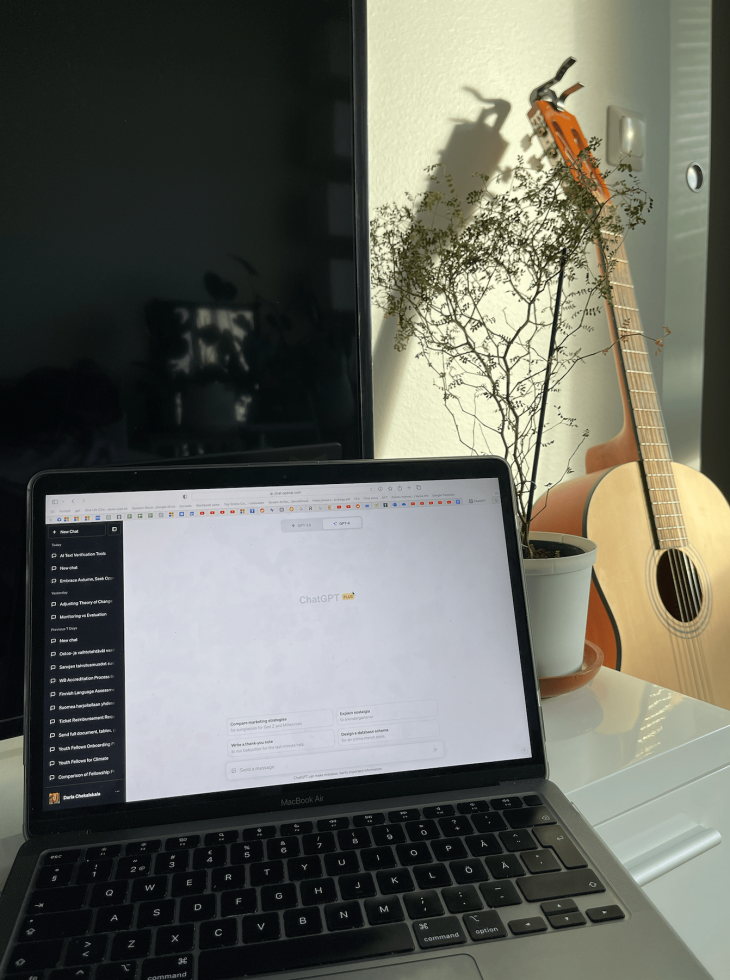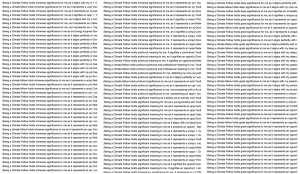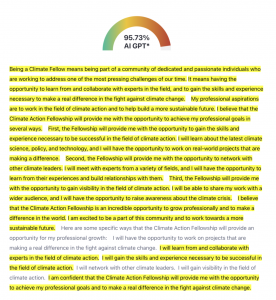
Don’t use ChatGPT in your job application in 2024
Now that I’ve got your attention, let’s talk about something we’re all guilty of – using ChatGPT for our job applications. And no, this isn’t a call to cancel the use of ChatGPT. Instead, I am here to provide you with some practical tips based on real-life experiences to help you stand out (in a good way) when applying for career opportunities.
Back in spring 2023, Edufication, a service developed by South-Eastern Finland University of Applied Sciences that produces and publishes online micro courses, hosted a Masterclass on the use of AI. Who would have thought that the development of chat GPT would speed up so much that the predictions of our speakers came true within a couple of months? AI is now popularized and considered a current skill.
Despite ongoing debates about AI security in Europe, there are other ethical and efficiency aspects to consider when it comes to chat GPT. It’s almost impossible to imagine getting through studies or work without the help of ChatGPT. It’s a game-changer that saves us all so much time and boosts productivity. If you’re a student, recent grad, or young professional, you know the struggle of applying for internships, entry-level positions, and other opportunities. That’s why it’s vital to get on top of using AI.
At Edufication, we’re always exploring ways AI can enhance learning. We’re talking everything from writing better course descriptions, to creating unique images, to summarizing instructions and making course materials more accessible. And let’s be real – there’s still so much potential for what we can achieve.
While sharing career opportunities with you (in this, this and that articles), I also wanted to share some observations from my time reviewing applications for different projects at XAMK and beyond.
Take a look at this – hundreds of applications that all start with the same chat GPT-generated sentence. Talk about a nightmare for your application!

To start with, there is a tool to check if the text was written with chat GPT. Yes, there are many people who just copy-paste. If you want to use ChatGPT to help you with word choice, error correction or structure, it’s fine. But you may be wondering to what extent you can rely on AI before it is obvious that this piece of text is not 100% human-written. To check yourself (or someone else) you can use Detector tool.
When hundreds of people apply for the same opportunity, it is EASY to spot the traces of ChatGPT in their applications. Unedited, copy-pasted ChatGPT text can be identified by specific features. Some of these features include:
- Suspicious use of squared brackets […]: While not definitive, frequent and unnecessary use of ellipses can be an indicator that a text has been generated by AI.
- ChatGPT usually provides with such text: [Introduction] Text… [Your expertise] Text… [Your motivation] Text…
- Quotation marks (” “): If you notice that a piece of text is enclosed in quotation marks, it could be a sign that the text has been copied directly from ChatGPT. Why would the applicants put their own answers in quotation marks?
- Wikipedia-like information: AI, including ChatGPT, often pulls from extensive databases and can provide information that is similar in style and content to a Wikipedia entry. Instead of the actual answer on why you want to become an Intern, it provides you with a definition of the Internship.
- Tips for answering the question: In some cases, ChatGPT may generate tips or advice on how to answer a specific question, which can be a giveaway that the text has been AI-generated.
- “When asked about your experience with climate activism, focus on specific projects or initiatives you have been involved in. Highlight the impact of these efforts and the skills you gained as a result.”
- Divided and labeled paragraphs: ChatGPT typically structures its responses in a clear and logical manner, dividing the text into paragraphs and sometimes even providing headings.
- “Background: I have a degree in Environmental Science and have been actively involved in climate advocacy for the past five years.
- “Skills: My skills include project management, data analysis, and public speaking.
- “Future Goals: If awarded this fellowship, I plan to focus on developing innovative solutions to reduce greenhouse gas emissions.”

This example shows that Chat GPT texts without human input are usually really general and easily detected. Such answers that do not reflect your specific background, motivation and strong sides can’t help you get your dream internship or job. You can apply with this text for any opportunity – too bad none would accept you though.
Now you know how your application looks from the side of the reviewer and what things to avoid in your application if don’t want it to be disqualified. But of course, ChatGPT can help you to get your dream fellowship, the intern position or the fully-funded spot on a forum. You can use these steps to ensure you are using AI in the right way:
- Start by asking ChatGPT to help summarize and clarify the questions.
- Provide ChatGPT with your CV and motivational letter to identify and allocate highlights for each question.
- Write a draft of your responses and ask ChatGPT to review for logic and grammar.
- Specify the tone, style, and format you want, whether formal or conversational.
- Reflect on the text to ensure it truly represents you, adding personal touches and emotional stories.
- Remove unnecessary editing, such as brackets and quotation marks, applied by ChatGPT.
- Run your text through a plagiarism detector to avoid copying and pasting ChatGPT responses directly.
Just in case you were curious, yes, ChatGPT was indeed used to correct the grammar in this text.
Xamk is involved in Talent Boost work, aiming to advance employment and attachment of international talents to Finland. For more information, do not hesitate to contact talentboost(at)xamk.fi.
Daria Chekalskaia,
Production Assistant of Edufication.com and Environmental Engineer
- 5 great opportunities to apply now and enjoy in 2025 - 13th December 2024
- 10 Must-Have AI Tools for Students to Make Studying Easier - 5th December 2024
- What happened in Baku - 29th November 2024
